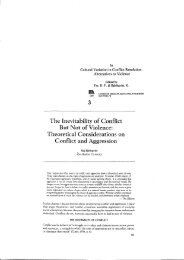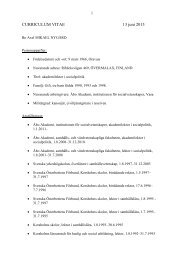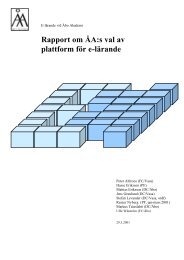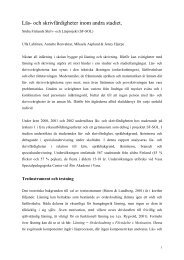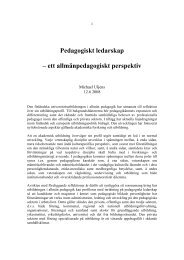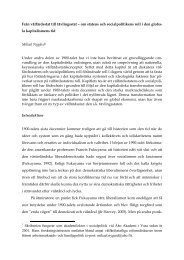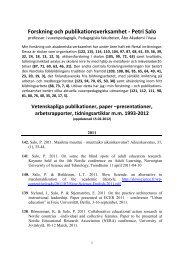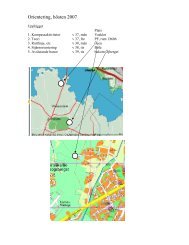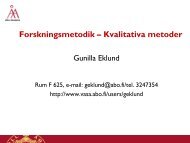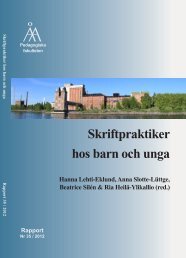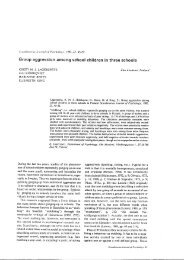Parties, Candidates and Citizens On-Line - Åbo Akademi
Parties, Candidates and Citizens On-Line - Åbo Akademi
Parties, Candidates and Citizens On-Line - Åbo Akademi
Create successful ePaper yourself
Turn your PDF publications into a flip-book with our unique Google optimized e-Paper software.
Introduction<br />
“Thus for the first time we have an opportunity to create artificial town<br />
meetings among populations that could not otherwise communicate” (Barber,<br />
1984: 274)<br />
During the 20th century, political communication experienced major changes. The<br />
modernization of society weakened the links between political parties <strong>and</strong> voters <strong>and</strong><br />
increased the importance of the media in political communication. Where political parties<br />
previously relied upon mass meetings <strong>and</strong> partisan press to communicate with voters, they<br />
are now increasingly channeling their messages through private media outlets (e.g. Norris,<br />
2001a; Salokangas, 1999; Swanson <strong>and</strong> Mancini, 1996). Journalists have developed an<br />
independent professional identity <strong>and</strong> apply professional techniques in their everyday<br />
profession (Altheide <strong>and</strong> Snow, 1979; 1991; Asp, 1986; Blumler & Gurevitch, 1995;<br />
Carlson, 2000; Swanson <strong>and</strong> Mancini, 1996). The parties seek votes from all segments of<br />
voters (Kirchheimer, 1966) <strong>and</strong> the citizens are finding it hard to separate party messages<br />
from each other. The number of uncertain voters is increasing which, in turn, has resulted<br />
in decreasing party membership figures <strong>and</strong> electoral turnout (Djupsund <strong>and</strong> Carlson,<br />
2003: 40; Dalton, 2000: 19-36; Mair <strong>and</strong> van Biezen, 2001; Scarrow, 2000: 79-101;<br />
Sundberg, 1996: 236).<br />
The rise of the internet in the 1990s raised hopes of a revival of the weakened<br />
political communication <strong>and</strong> democracy (e.g. Berman <strong>and</strong> Witzner, 1997: 1313-1321;<br />
Dahl, 1989: 519-522; Norris, 1999a: 2-3). Compared to the traditional political outlets, the<br />
internet has several theoretical advantages. The web is cheap <strong>and</strong> fast to use, multimedia<br />
transmissions are easily achieved <strong>and</strong> publishing is not subject to editorial intervention. In<br />
addition, the internet could arguably be regarded as the first fully interactive<br />
communication channel (Bimber, 1999: 412; Coleman <strong>and</strong> Goetze, 2001: 5; Kamarck,<br />
1999: 114; Stromer-Galley, 2000: 112).<br />
Political discussion boards on the web have, from the viewpoint of participatory<br />
democracy, been considered the modern equivalents of political ‘town hall’ meetings (e.g.<br />
Budge, 1996: 28-31; Dahl, 1989: 519). The discussion boards resemble arenas in which all<br />
citizens can discuss, debate <strong>and</strong> express their opinions on public matters (Bentivegna,<br />
1998: 2-3; Hill <strong>and</strong> Hughes, 1998: 2-3; Norris, 1999b: 72; Rheingold, 1993: xxx). These<br />
debates have the potential to increase the citizens’ political knowledge, political interest<br />
<strong>and</strong> social capital (Barber 1984; Harwood & Lay, 2001; Shah et al., 2001).<br />
However, there is still much uncertainty whether the theoretical assumptions<br />
regarding the potential inherent in discussion boards will ever be realized in reality.<br />
146



